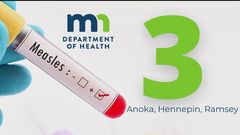Measles, also known as morbilli, English measles, or rubeola is an infection of the respiratory system, immune system and skin caused by a virus, specifically a paramyxovirus of the genus Morbillivirus. Symptoms usually develop 7–14 days after exposure to an infected person and the initial symptoms usually include a high fever, Koplik's spots, malaise, loss of appetite, hacking cough, runny nose and red eyes. After this comes a spot-like rash that covers much of the body. The course of measles, provided there are no complications, such as bacterial infections, usually lasts about 7–10 days. Measles is an airborne disease that is spread through respiration, and is highly contagious—90% of people without immunity sharing living space with an infected person will catch it. An asymptomatic incubation period occurs nine to twelve days from initial exposure. The period of infectivity has not been definitively established, some saying it lasts from two to four days prior, until two to five days following the onset of the rash, whereas others say it lasts from two to four days prior until the complete disappearance of the rash.

- Measles vaccination campaign launched in DRC

- Oregon Health Authority warns of possible measles exposures in Marion County stores

- 3 new measles cases reported in MN







